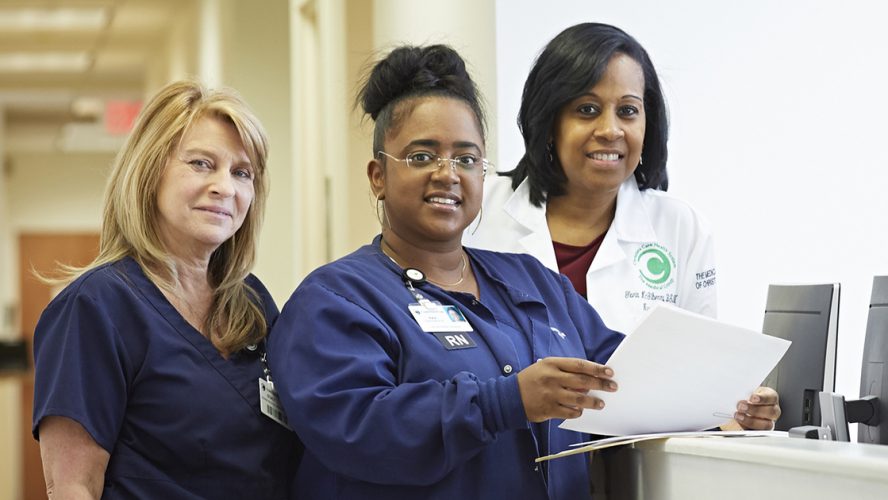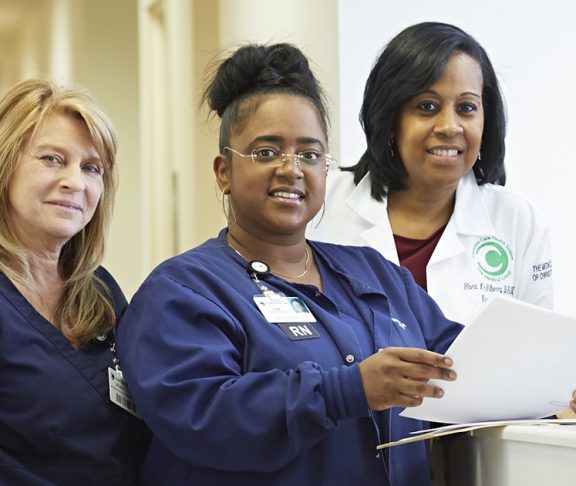While women make 80 percent of the healthcare buying and usage decisions and comprise 65 percent of the workforce, there remains a gap in female leadership.
Though women represent 30 percent of healthcare leadership roles, progress is being made.
“It’s absolutely essential to have women in leadership roles,” says Janice E. Nevin, M.D., MPH, president and CEO of ChristianaCare, a private not-for-profit regional healthcare system based in Delaware. “By building a healthcare workforce with diversity at every level, we are better able to make a positive impact on the health of everyone in all of the communities we serve.”
A family medicine physician, Dr. Nevin has over 20 years in the industry. In the beginning of her career, she was one of a few women doctors in a male-dominated field. She remembers working hard to fit in. Now she’s the CEO and leading the way for other women to succeed in the field.
Being intentional
As CEO, a role she has held for the past five years, Dr. Nevin is focused on diversifying the workplace and being more inclusive. The top executive team of 10 is comprised of five men and five women. Over 74 percent of all ChristianaCare leaders are women, a 27 percent increase since five years ago. Nationally, 36 percent of first- or mid-level officials at S&P 500 companies are female and only 25 percent of executive- and senior-level officials and managers are female. And 44 percent of ChristianaCare’s physicians are female — an increase of nearly 40 percent since 2015. Nationally, 37 percent of all physicians are women.
“We have some exceptional women in some of the medical disciplines that are more traditionally occupied by men,” says Dr. Nevin, noting women are excelling in cardiology, as well as transplant, bariatric, and neurointerventional surgery.
Leaning in
“I think it’s an amazing time for leadership, particularly in healthcare,” says Dr. Kara Odom Walker, secretary of Delaware Health and Social Services. “We’re starting to see more women in medical school classes and more women taking on leadership roles.”
She remembers meeting Dr. Nevin nearly 20 years ago and admiring her personally and professionally. These days she’s grateful they work in partnership in Delaware.
“It’s made a huge difference to me to be able to look up to women like her and others who’ve taken on leadership roles in medicine,” says Dr. Odom Walker.
Dr. Nevin encourages women to say yes to opportunities for career growth, even when they’re a little outside their area of expertise.
“Be intentional about working to get on a team or be part of a project that’s outside of your department, outside your area,” she says. “Because it really is how we grow.”
Diversity and innovation
Dr. Nevin believes that the diversity of her organization and her leadership team is a competitive advantage, because the varied perspectives help to support an innovative approach to care.
“We are reimagining how we deliver care — to deliver health, not just care, to the people we serve,” she says. “How do we partner with people to help them achieve the health goals that are important to them and do it in a way that respects cost and creates affordability?”
Dr. Nevin says decisions made today will impact how the next generation experiences healthcare. She’s optimistic about the future.
“It’s really being able to look at health and wellness in a very different way — transforming the delivery system, investing in mental health, and really connecting deeply with community resources around social care that I think is essential if we’re going to create the system of the future.”


